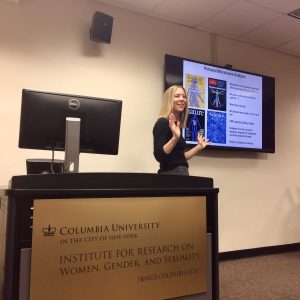Cinnamon Bloss: “Consumers, Citizens, and Crowds in the Age of Precision Medicine”

Professor Cinnamon Bloss (UC San Diego) gave a fascinating talk for the Precision Medicine: Ethics, Politics and Culture working group at the Center for the Study of Social Difference on February 15, 2018.
At the center of her talk was the problem of diffusion of medical innovation. This problem is not a new one. There is longstanding research on processes of adoption of innovation. Physicians as well as patients have historically hesitated to experiment with innovative technologies, and issues of privacy and trust have persisted. Inequality and distributive injustice has also traditionally been a problem as it is often wealthy individuals who enjoy innovative technologies long before they become standard therapies. A few historical examples are Serum treatment for pneumonia in the 1920s, Arsenic treatment for syphilis in the 1930s, Chemotherapy for varied cancer in the 1960s, and Experimental HIV treatment in the 1980s.
Professor Bloss engages with these complex and longstanding questions in her research in relation to Precision Medicine (PM). Her work addresses the considerable bioethical challenges that come with the rise of new technological innovation and practices of PM. And her analysis spans three analytical levels: individual, systemic, and societal.
What is remarkable and important about Professor Bloss’s work is that while many researchers take for granted that issues such as “privacy,” “trust,” and “participation” are challenges to PM, Professor Bloss adopts a critical perspective in trying to understand what those terms even mean in the arena of PM.
Instead of taking concepts from bioethics as given, she builds on previous work to empirically investigate the current bioethical dilemmas of PM. Her work is oriented to empirically understand the various norms, expectations and challenges entangled in the notion of “privacy” for patients. In what specific ways does ‘privacy’ affect trust and patient participation? And what are the current expectation of patients from PM?
Professor Bloss also attempts to understand the specific views of physicians towards PM and the specific gaps common to both clinical practice and PM. What motivates practitioners to turn to PM, and what obstacles prevent the diffusion of new technologies? On point of consideration is that transformation in the position of the FDA towards distribution of direct to consumer test results is especially important in shaping the current climate.
The significance of this research is in emphasizing that new technologies of PM transform the traditional concerns and problems for researchers, doctors, regulators and patients. We must continue to follow the evolution of notions and practices of ‘privacy’, ‘trust’, ‘regulation’ or ‘protection’ to understand current events.
In this context, Professor Bloss’s work on Direct to Consumer (DTC) strategies in PM is especially important, as it shows how the field of bioethics and its fundamental challenges are being transformed in a new healthcare economy.
In her research, Professor Bloss examines the American Gut Project to try and understand both new strategies for raising money for research (with the decrease in availability of public funding for research) and new models of patient consumerism. What drives Americans to participate in microbiome research? Which demographics are most likely to participate? What types of result do Americans expect? What if our ability to interpret the data and articulate its clinical implications is very limited? Are participants only interested in recognitions for their contribution to research or do they expect the data to help them manage their health proactively? And what will happen when we are able to interpret results and link microbiome profiles to clinical risks? Among other legal and ethical challenges, we might consider: would we have to report such results to employers and insurers?
Professor Bloss’s work opens up new avenues in understanding the new healthcare economy based on DTC and PM and their unique challenges. We are grateful that she so kindly and expertly discussed these topics with our PMEPC graduate fellows and the public at large.
Contributed by Moran Levy

